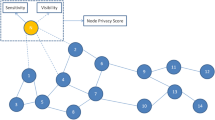Abstract
Personalization is used in social networking Web sites to endow users’ need to serve better which are widely researched, but little is known about the role of privacy concern, control of the user toward trust building, and the decision to making with personalized social networking Web sites. This research develops a model to identify the effect of content personalization on users’ privacy concerns and desire to control social networking Web sites and also shows users’ trust building to predict users’ intention to revisit social networking. The result shows users to develop higher privacy concerns and more desire to control with higher content personalization in social networking sites; it also identifies a high correlation of privacy concerns, control of users in trust building, and positive behavioral intentions toward social networking sites. The model fit result shows a good fit for the proposed model which further can be used in personalization design and implementation strategies in social networking sites.
Access this chapter
Tax calculation will be finalised at checkout
Purchases are for personal use only
Similar content being viewed by others
References
Al Qudah DA, Al-Shboul B, Al-Zoubi A, Al-Sayyed R, Cristea AI (2020) Investigating users’ experience on social media ads: perceptions of young users. Heliyon 6(7)
Appel G, Grewal L, Hadi R, Stephen AT (2020) The future of social media in marketing. J Acad Mark Sci 48(1):79–95
Chellappa RK, Shivendu S (2006) A model of advertiser—portal contracts: personalization strategies under privacy concerns. Inf Technol Manage 7(1):7–19
Chellappa RK, Sin RG (2005) Personalization versus privacy: an empirical examination of the online consumer’s dilemma. Inf Technol Manage 6:181–202
Dwyer C, Hiltz SR, Passerini K (2007) Trust and privacy concerns within social networking sites: a comparison of Facebook and MySpace. In: Americas conference on information systems, proceedings of the thirteenth Americas conference on information systems, Keystone, 9–12 Aug, Colorado, USA, p 339
Desai D (2019) Personalization aspects affecting users’ intention to revisit social networking site. Int J Trend Sci Res Dev (IJTSRD) 4(1):612–621. ISSN: 2456-6470. https://doi.org/10.31142/ijtsrd29631
Taylor DG, Davis D, Jillapalli R (2009) Privacy concern and online personalization: the moderating effects of information control and compensation. Electron Commerce Res 9:203–223. https://doi.org/10.1007/s10660-009-9036-2
Desai D (2019) An empirical study of website personalization effect on users intention to revisit E-commerce website through cognitive and hedonic experience. In: Balas V, Sharma N, Chakrabarti A (eds) Data management, analytics and innovation. Advances in intelligent systems and computing, vol 839. Springer
Gupta A, Dhami A (2015) Measuring the impact of security, trust and privacy in information sharing: a study on social networking sites. J Direct, Data Digital Market Pract 17(1):43–53
Stevenson D, Pasek (2015) Privacy concern, trust, and desire for content personalization (March 30, 2015). In: The 43rd research conference on communication, information and internet policy
Mohamed N, Ahmad IH (2012) Information privacy concerns, antecedents and privacy measure use in social networking sites: evidence from Malaysia. Comput Human Behavior 28(6):2366–2375
Shin D (2010) The effects of trust, security and privacy in social networking: a security-based approach to understand the pattern of adoption. Interact Comput 22(5):428–438. https://doi.org/10.1016/j.intcom.2010.05.001
Senthil Kumar N, Saravanakumar K, Deepa K (2016) On privacy and security in social media—a comprehensive study. Phys Procedia 78:114–119
Tucker CE (2014) Social networks, personalized advertising, and privacy controls. J Mark Res 51(5):546–562
Komiak S, Benbasat I (2006) The effects of personalization and familiarity on trust and adoption of recommendation agents. MIS Q 30(4):941–960. https://doi.org/10.2307/25148760
Aldhafferi N, Watson C, Sajeev ASM (2013) Personal information privacy settings of online social networks and their suitability for mobile internet devices. Int J Secur Privacy Trust Manag 2(2):1–17
Anderson JC, Gerbing DW (1988) Structural equation modeling in practice: a review and recommended two-step approach. Psychol Bull 103(3):411–423. https://doi.org/10.1037/0033-2909.103.3.411
Fornell C, Larcker D (1981) Evaluating structural equation models with unobservable variables and measurement error. J Mark Res 18(1):39–50. https://doi.org/10.2307/3151312
Bagozzi RP, Yi Y (1988) On the evaluation of structural equation models. JAMS 16:74–94
Hair Jr, J. F. et al. (1998) Multivariate Data Analysis with Readings. Englewood Cliffs, NJ: Prentice-Hall.
Bentler PM, Bonett Douglas G (1980) Significance tests and goodness of fit in the analysis of covariance structures. Psychological Bulletin 88(3):588–606.
Jöreskog KG, Sörbom D (1981) LISREL V user's guide. Chicago: Int Educational Services.
Hu LT, Bentler PM (1999) Cutoff criteria for fit indexes in covariance structure analysis: conventional criteria versus new alternatives. Struct Eq Model 6:1–55
Browne MW, Cudeck R (1993) Alternative Ways of Assessing Model Fit. Sage Publications, Newbury Park, CA.
Author information
Authors and Affiliations
Editor information
Editors and Affiliations
Rights and permissions
Copyright information
© 2021 The Author(s), under exclusive license to Springer Nature Singapore Pte Ltd.
About this paper
Cite this paper
Desai, D. (2021). Role of Privacy Concern and Control to Build Trust in Personalized Social Networking Sites. In: Sheth, A., Sinhal, A., Shrivastava, A., Pandey, A.K. (eds) Intelligent Systems. Algorithms for Intelligent Systems. Springer, Singapore. https://doi.org/10.1007/978-981-16-2248-9_10
Download citation
DOI: https://doi.org/10.1007/978-981-16-2248-9_10
Published:
Publisher Name: Springer, Singapore
Print ISBN: 978-981-16-2247-2
Online ISBN: 978-981-16-2248-9
eBook Packages: Intelligent Technologies and RoboticsIntelligent Technologies and Robotics (R0)




